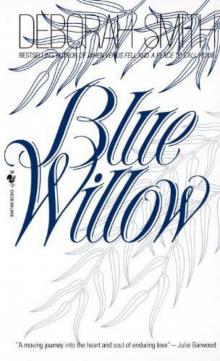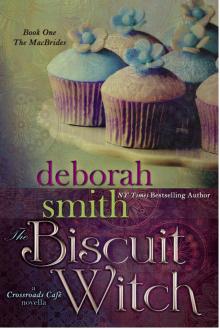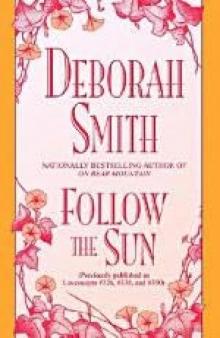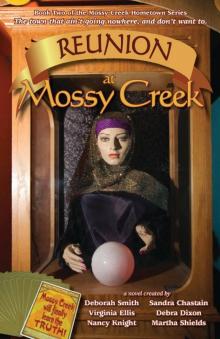- Home
- Deborah Smith
Miracle Page 4
Miracle Read online
Page 4
Scowling, Beaucaire slapped the arm of the couch. “Respect!”
Sebastien drained the glass and thumped it down on Beaucaire’s desk. “Honesty, Pio. Au revoir.”
He strode from the building, his hands clenched. The one thing he would never do is cause any woman the grief his father had caused his mother. When he saw Amy Miracle crossing a field toward the woods beyond, a lunch box swinging from her hand, he halted and watched her. There was one way to settle this niggling little infatuation of his. He’d simply speak with her, and break the spell.
He trailed her along a path into the woods and debated briefly whether she’d be frightened when she noticed him. Sebastien grimaced at the idea of how this looked—him tracking her into dense forest. He lifted his head and called her name. Her reaction was a startled jump. She swung around on the trail and stared at him, shock evident in her stance, her feet posed as if she might run. Again she wore her hat and sunglasses, baggy shorts, and a plain white blouse. Underneath the hat and glasses her mouth opened in a circle of dismay.
“May I talk to you a minute?” he asked, approaching her slowly.
“Is somethin’ wrong? Did I do somethin’?”
“No, nothing.”
“Oh.” She wavered in place, not looking particularly reassured. Her gaze kept darting over his casual khaki trousers and loosely-woven white cotton pullover as if they were strange. “You look different today.”
“Clean, I hope. And wearing shoes.” Sebastien stopped several feet from her. “You were going to sit on the rock beside the creek?”
“Oh! You know about it, too!”
“Yes. It’s such a pretty spot.”
She nodded awkwardly. “But if it’s your spot, I’ll go back to the winery.”
“No, of course not. Would you mind if I sat with you while you eat lunch?”
“Heck, no.” She went along the path sideways, crossing one foot over the other while her gaze never left him. Her nervousness and lack of poise was so totally unsophisticated that he felt sorry for her.
“Here, let’s walk together, before you hurt yourself,” he told her, trying not to smile.
“Oh. Okay.” She halted, moved quickly to the edge of the path, and clutched her lunch box in front of her like a shield.
Sebastien stepped to her side and gestured forward with one hand. She looked straight ahead as they walked the remaining short distance to a small creek. The spicy-sweet smell of wildflowers scented the cool, creek-bottom air, and the sunlight was dappled by the greenery of drooping trees. The creek made a pleasant whispering sound. It was an intoxicating place, and he began to regret his decision to follow her there.
She climbed atop a granite outcropping and sat down stiffly, her legs crossed. Sebastien lowered himself to the mottled gray stone a comfortable distance from her and curled one long leg under him. He propped his arm on his updrawn knee.
“Mr. Beaucaire doesn’t like me, now,” she said, staring rigidly at her lunch box. “I’m real sorry about botherin’ you.”
“Why do you say that? You were only trying to help.”
“I feel sort of responsible for making Mr. Beaucaire mad.”
“Hmmm. Do you always feel responsible for so much?”
Her mouth tightened. “Yeah.”
“That’s too bad. You’re a very kind person, very thoughtful.”
She fumbled with her sunglasses, removed them, and carefully put them in the pocket of her shirt. Her face was delightful; the eyes nearly hidden behind thick brown lashes, the nose upturned, the large, expressive mouth dimpled on both sides. There was character in it, and intelligence, and a great deal more maturity than he’d expected. “I felt sorry for you,” she announced. “You looked sort of rough.”
“I appreciate your concern. But perhaps it’s not wise to feel sorry for me. Perhaps I’m a terrible person.”
“Oh, right,” she said without conviction.
“I want you to understand what was going on with me the other morning. I hadn’t had any sleep for three days. I’d been at the hospital—there was an emergency. For a moment in the vineyard I felt sick—it was only from needing sleep and food.”
“How come you don’t sleep or eat?”
He laughed dryly. “I have a tendency to forget everything but my work.”
She opened her lunch box and reached inside. “Here. I’ve got plenty.” Between them on the smooth granite she spread candy bars, packages of crackers, and several apples.
“Plenty! Were you expecting guests?”
She blushed. “I just shoved whatever I could find into the box last night. I was in a hurry.”
He took some crackers. “Thank you.” His attention went to the book she laid aside. “Ah! Do you like Tolkien?”
“A lot. Yeah.”
“What do you enjoy about his work?”
“It’s easy to tell who’s good and who’s bad. I like that.”
Sebastien nodded in approval. “I agree. The real world has too many shades of gray.”
“Yes!”
They traded assessing looks, like two travelers sizing each other up for a long trip along the same road. Then her boldness faded and, again, she stared at her food. Sebastien had never encountered such a mixture of shyness and maturity before. While he opened the package of crackers she fidgeted with the wrapping on a piece of candy. “You’re a doctor?”
“A heart surgeon. Yes.”
“I always think of doctors as being older.”
“I’m finishing my studies. And I’m younger than most. I entered the university in Paris when I was only fifteen.”
“How old are you now?”
“Twenty-nine.”
“Oh!” She chewed her candy bar rapidly and frowned into the forest.
“Is that too young, or too old?” he inquired coyly.
“A lot older than me, but not as old as I thought heart surgeons had to be.”
“I assure you, mademoiselle, that I am one of the best.”
“Where do you work?”
“At Gregory University Hospital.”
“I know where that is. A girl I knew had to have a tumor operation, and her doctor sent her there. A bunch of us went down to Atlanta to visit her. It was the prettiest hospital I’d ever seen.”
“I’m glad you were impressed.”
She smiled at his droll tone. Her courage apparently growing, she inquired, “How come you work here and not in France?”
He put a hand over his heart dramatically. “I wanted to escape!”
She looked at him askance. “From what?”
“Convention! Tradition! Existential despair! The theories of Descartes!”
Her eyes gleamed with intrigue. He ate the crackers and thought to himself that her eyes were the same shade of green that one found in a fine piece of jade.
“You own this whole place?” She gestured uneasily toward the vineyards.
“My family’s company owns it. I have stock in the company, so that makes me a part-owner.”
“It’s beautiful. I love workin’ here.”
“You are just graduated from high school, yes?”
“Yes.”
“And will you go to a university in the fall?”
Her gaze fell. She busied herself polishing an apple on the leg of her denim shorts. “I’m not goin’.”
“You have so much intelligence—in your eyes, in your voice. You can’t let that go to waste.”
“I’m not a very good student. Average.”
“But what work will you do if you don’t go to college?”
“Hmmm, I don’t know.”
“You live at home, with your parents?” She nodded. “So you will live there until you decide?”
She exhaled sharply. “Aw, I don’t know what I’ll do. I might get married or something.”
“You’re very young to do that.”
For all her shyness, she glared at him. “I’m eighteen.”
“Ah, such an elderly woma
n. I see.”
“You’re … you’re really opinionated.”
He shook his head. “No, I’m an aggressive, compulsive, arrogant, Type A personality. I’ve been told that many times. So there.”
She burst into laughter, the most attractive laughter he’d ever heard, the sort that makes other people want to laugh too. He listened with bittersweet elation, trying to recall how long it had been since he’d enjoyed talking to anyone this much.
“I guess I can’t argue if you already know that you’re opinionated,” she said finally, peering at him from under the brim of her hat.
“I’m glad to argue with you. That means you’re comfortable with me.”
She thought for a moment, looking shocked. “That’s a new one.”
Sebastien noticed wisps of auburn hair feathering her forehead and wished that she’d remove her hat so he could see the rest. Looking at her both aroused and calmed him. “Don’t ever let anyone call you names,” he told her abruptly, his tone now serious. “You’re not worthless. Pio—Mr. Beaucaire—didn’t mean to say that. He certainly had no right to abuse your honor.”
Her face turned red and she seemed stunned. After several stammering attempts to speak, she finally managed to say, “You make me feel important.”
“Believe in yourself. You must always consider yourself the most special person in the world.” He smiled thinly. “Of course, there are times when one can take such arrogance too far. But I doubt you’d do that.”
“I don’t know how to be arrogant at all.” Her voice trembled. “But thank you. Thank you a lot. I bet you’re a great doctor. You know how to make people feel better just by talkin’ to them.”
Leave. Leave this second, he told himself.
“You’re a very good patient.” He forced himself up, cursing silently. In a few weeks he would be on his way to west Africa to serve eighteen months at the hospital and university in Abidjan, Cote d’lvoire. He had put off his military service until now, and he had chosen to fulfill it by working and teaching in the former French colony rather than by serving in the army. He had no time for this distressing fascination.
Amy Miracle stirred awkwardly and then gazed up at him. He reeled from the open adoration on her face. “I’ll never forget what you did the other day,” she murmured. “Sticking up for me, I mean.”
Pleasure flashed through him along with bitter self-reproach. He was not like his father, not a self-centered bastard who put impulsive ideas ahead of responsibility. Sebastien knew what he could accomplish with this shy young woman, this strange little Miracle, if he wanted, but he wasn’t going to do it.
“I’ll leave you to enjoy your lunch,” he told her. “It’s been very nice meeting you.”
Disappointment dimmed her eager expression; then she looked down, becoming polite and withdrawn. “It’s been nice meetin’ you. Maybe I’ll see you again, if you come back to pick grapes.”
I’ll make certain not to do that, he thought to himself angrily. “Perhaps. Adieu.”
“Adieu,” she repeated softly, drawling the word, making it both funny and sad. He gazed at her for a moment, hypnotized, then shoved the disturbing response from his mind and walked away.
Pop was asleep when she got home from work, as usual, propped up on orthopedic pillows in his and Maisie’s bedroom with the door open and the window air conditioner running full blast. On one wall was his circus shrine—photographs of himself when he worked for Ringling Brothers, yellowing handbills from shows long past, and a 1952 movie poster advertising “the Greatest Show on Earth,” in which he had been an extra. There was a picture of him with Jimmy Stewart, and on it was an autograph that said, “To Zack, the greatest clown on earth.” And low on the wall there was one small, crinkled photograph of Zack with Amy’s mother.
Tall, redheaded, and gorgeous, Ellen Connery Miracle had been a Rockette at Radio City Music Hall before joining the circus as her brother’s assistant in a trained-dog act. Two years after she married Zack Miracle she died giving birth to Amy. Occasionally he liked to remind Amy of that fact.
Maisie sat in the living room watching soap operas from her favorite chair, a plaid recliner she’d bought at a flea market for a hundred dollars. She wore overalls over one of Pop’s white T-shirts. Her mostly gray brown hair was pulled back from her placid face by a dime-store headband. On her generous lap was a large grocery bag filled with green beans. She peeled strings from the beans, snapped them into neat pieces, and rocked contentedly, her attention riveted to the action on The Guiding Light.
Maisie was sweet and silent and not particularly smart or pretty, which were all assets as far as Pop was concerned. They were the reasons she and he had remained happy together for the past ten years. Maisie let Pop rule the world. She even made excuses for the marijuana plants he grew in the back rooms. He had a bad back. The dope was for medicinal purposes. Just like the booze. Amy understood all that and felt sorry for him, but it didn’t make life easy.
She waved at Maisie and started toward the kitchen for a glass of water. As she walked wearily through the living room Maisie mumbled and rubbed her forehead as if trying to remember something. “Oh, year. Charley called. He’s got to work tonight. He and his daddy are taking a truckload of pullets to the plant in Jasper. He said he’ll be by at six tomorrow to carry you to church.”
“Thanks, Mams.” She went to her bedroom and locked the door, then leaned against it, her eyes shut. She put her straw hat on the room’s dresser and dropped her sweaty, dirty clothes to the floor. Her body felt hot and confused inside; she was sad, restless, elated, and afraid.
On her bed was Pop’s daily list of chores, made out in his sloppy, bold script. The unforgiving length of the list made her angry, and she shoved it onto the floor then stood, naked, and gazed around her room as if seeing it for the first time.
The furniture was still discount-store castoffs, the twin bed still creaked when she kicked it with one foot, and the walls were still covered with posters of movie and television stars. In one corner her fold-out stereo sat on an old trunk that had belonged to her mother. In a cardboard box beside it were Amy’s comedy albums and the soundtracks from Broadway musicals. On the dresser sat the tiny black-and-white TV Pop had given her for Christmas three years before. That was the best Christmas she’d ever had.
Moving woodenly, she went into her tiny bathroom and took a shower. When she dried herself she scrubbed the towel over her body for a long time, her hands almost frantic. She threw herself across the bed and rolled onto her back. Shutting her eyes, she draped one arm over them, then put a hand between her legs. Such unadorned need had never surfaced in the daytime before, and it embarrassed her. Then images of Dr. de Savin destroyed her control and she stroked herself until her ache burst into such desperate pleasure that she arched upward and bit her arm to keep from crying out.
Shivering, she hugged herself and stared at the ceiling. There was so much more to want from the world than she had ever realized.
Sebastien did not pride himself on his bedside manner. But then, he excused himself, there was a strong element of macho reserve in all cardiac surgeons. So many operations meant life or death for the patients, and success was measured, quite literally, in the whisper of a heartbeat.
He gazed without pity at the fat, florid little woman who was crying. She dug pink fingers and manicured nails into her bedcovers. Her face was screwed into a childlike visage of misery. “I’m going to die,” she wailed. “I just know I’m not going to survive my bypass operation.”
Sebastien clasped his hands behind his back. Standing beside her bed, he trained his gaze on a mauve flower appliquéd on her robe. “There is that risk in any kind of surgery. I can quote success statistics, but I can’t give you guarantees.”
From the corner of his eye he noticed the cardiac counseling nurse glaring at him. She grasped the patient’s hands. “Mrs. Spencer, your prognosis is excellent. You really shouldn’t worry.”
“B-but Dr. de S
avin said—”
“Your chances of having a successful operation are very high,” Sebastien told her. “You’ll die if you don’t have the surgery. Think of it that way.”
Mrs. Spencer’s eyes widened. She stared at him in horror. “I don’t want to think of it that way!”
The nurse patted her hands. “What Dr. de Savin meant—”
“Was that you have no choice but to have a bypass,” Sebastien interjected. “That is simply all there is to it, madame, and you would serve yourself much better by calming down. I’m here to explain the clinical procedures, which are actually very reassuring. We are going to make an incision—”
“I want a tranquilizer!” Mrs. Spencer thrust the nurse’s hands away and jerked the bedcovers violently. Huge tears carried a flood of mascara down her cheeks. “I don’t want to hear about incisions!”
Sebastien turned impatiently toward the nurse. “Bring Mrs. Spencer five milligrams of diazepam. I’ll come back to see her in half an hour.”
He strode out of the room. The nurse followed, her hands jammed angrily into the pockets of her blue blazer. Cardiac-counseling nurses didn’t wear uniforms so they connected with patients on a more casual, comforting level. Sebastien thought their efforts frivolous.
“Dr. de Savin,” she called softly, her voice tight. “May I speak to you for a second, please?”
He halted. “Yes?”
She looked furious. “You need some sensitivity training, Doctor.”
“I’ll leave the hand-holding to you. I have no interest in playing word games with hysterical patients.”
“Can’t you imagine how frightened that woman is?”
“No. Frankly, I avoid using my imagination in such morbid ways. That’s why I’m such a good surgeon. I know how to direct my energy. Now get Mrs. Spencer a pill and call me when she’s ready to listen.”
“All right, Doctor.”
He turned to leave but caught her obscene gesture from the corner of his eye. He knew that she hadn’t meant for him to see it, and that if he reported her, she’d be fired. But he was more amused than offended. “You’re not the first, madame.” He glanced back at her startled expression before he walked away.

 Legends
Legends Hold on Tight
Hold on Tight Just a Little Bit Guilty
Just a Little Bit Guilty The Beloved Woman
The Beloved Woman Alice At Heart
Alice At Heart Heart of the Dragon
Heart of the Dragon Critters of Mossy Creek
Critters of Mossy Creek Diary of a Radical Mermaid
Diary of a Radical Mermaid Caught by Surprise
Caught by Surprise Stranger in Camelot
Stranger in Camelot At Home in Mossy Creek
At Home in Mossy Creek Charming Grace
Charming Grace Blue Willow
Blue Willow The Pickle Queen: A Crossroads Café Novella
The Pickle Queen: A Crossroads Café Novella On Bear Mountain
On Bear Mountain The Biscuit Witch
The Biscuit Witch Sara's Surprise
Sara's Surprise More Sweet Tea
More Sweet Tea The Apple Pie Knights
The Apple Pie Knights The Silver Fox and the Red-Hot Dove
The Silver Fox and the Red-Hot Dove Sweet Hush
Sweet Hush California Royale
California Royale Hot Touch
Hot Touch Miracle
Miracle The Stone Flower Garden
The Stone Flower Garden A Place to Call Home
A Place to Call Home Silk and Stone
Silk and Stone Honey and Smoke
Honey and Smoke Jed's Sweet Revenge
Jed's Sweet Revenge Silver Fox and Red Hot Dove
Silver Fox and Red Hot Dove The Kitchen Charmer
The Kitchen Charmer A Day in Mossy Creek
A Day in Mossy Creek Never Let Go
Never Let Go Summer in Mossy Creek
Summer in Mossy Creek On Grandma's Porch
On Grandma's Porch The Crossroads Cafe
The Crossroads Cafe Follow the Sun
Follow the Sun The Yarn Spinner
The Yarn Spinner A Gentle Rain
A Gentle Rain Reunion at Mossy Creek
Reunion at Mossy Creek